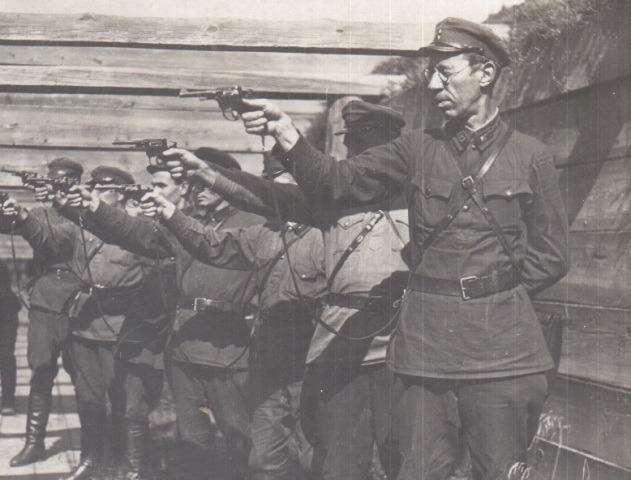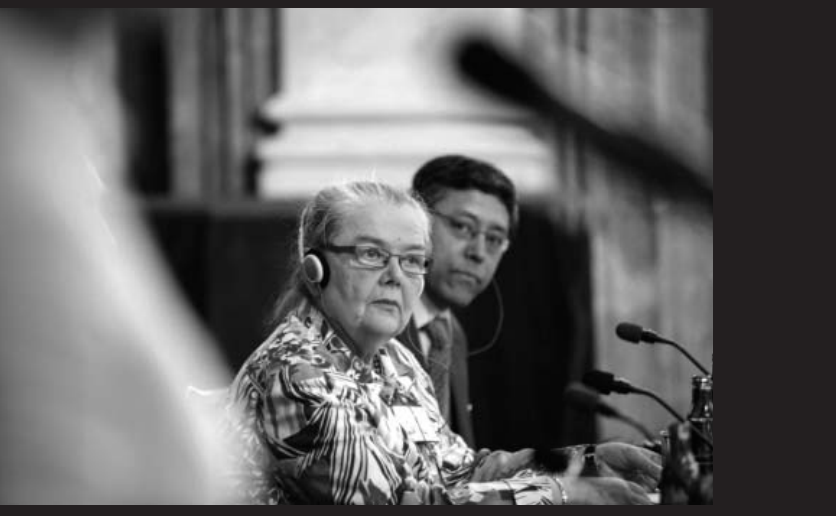Towards Legal Settlement of Communist Crimes: Belarusian Perspective

A presentation by Deputy Secretary for Foreign Affairs Mikałaj Pačkajeŭ in the European Parliament in 2012.
Introduction
The purpose of this presentation is to refer to the particular experience of Belarus with regard to Communist crimes without statutory limitations, in order to set forth the arguments that underpin the Rada’s position on international measures to secure legal redress for such crimes, as well as its support for creating an appropriate judicial body in the EU.
After a brief historical background overview, I will firstly point out that it follows from the particular experience of Belarus that unblocking the way to legal settlement for Communist crimes without statutory limitations will require, as a prerequisite, securing redress also in relation to crimes committed although after the formal demise of Communism – but deriving directly from the Communist system and ideology. I will also mention how that affects the current EU member states. Secondly, the experience of Belarus does highlight the need for creating a robust international legal framework to attain justice with regard to Communist crimes, as well as Communist-derived crimes. Finally, I will announce a proposal from the Rada of the Belarusian Democratic Republic in Exile for creating a norm of international law that would be instrumental for enabling international legal settlement for Communist crimes without statutory limitations.
Historical Background – Communist Crimes in Belarus
Waging a “revolutionary” war for Communist takeover in order to establish a world-wide Communist system was a core tenet and policy of Bolshevism when it took hold of Russia. Hence for such a government, the territory and resources of the country it controlled were only means for waging a war of aggression on its neighbours. In that sense, the Soviet Communist state a-priori resembled internationally a criminal enterprise rather than a proper state, and Belarus became one of its earliest victims.
A democratic Belarusian state was declared fully independent on the 25 March 1918 as the Belarusian Democratic Republic. Recognised by several other states but lacking support from the great powers of the age, in early 1919 it was overrun by Soviet Russia’s Red Army, its state institutions went into exile. Belarus was declared a Soviet republic, with the Red Terror fully unleashed. In 1921 it was then partitioned between Soviet Russia and Poland by the Treaty of Riga. A puppet Belarusian Soviet Socialist republic was re-established east of that border, incorporated into the USSR, and subjected to the full scale of early Soviet Bolshevik and later Stalinist terror. From 1929 on, the Communist “social cleansing” in Belarus was complemented by systematic persecution and destruction of its national educated class[1].
Special NKVD operations were also ordered from Moscow in Belarus in 1936-1937 targeting the Latvian, German and Polish ethnic minorities. After September 1939, the same fate was unleashed onto the Western areas of Belarus[2]. The repressions continued on a lesser scale after the Second World War. The overall number of peacetime victims[3], for which documentary references could be traced, is currently estimated around 700,000, i.e. about 10% of the population. A mass grave site near Minsk, Kurapaty, partially excavated in 1988, was estimated to have contained over 150,000 victims. Persecutions of dissidents, as well as policies of wiping out the country’s particular national identity (“denationalisation”[4]), continued in Belarus in various forms until late Perestroyka, as the Communist party there remained notoriously hard-line.
Lack of Justice for Communist Crimes at the National Level
Apart from a particular severity and length, the Communist crimes described above were largely a common experience of countries under Soviet domination. But unlike most others, neither a full vindication for the victims, nor bringing the perpetrators to justice, has become possible in Belarus at the national legal level so far.
In 1990-91 the Belarusian Popular Front’s pro-democracy minority in the last Soviet-era parliamentary assembly of Belarus achieved the adoption of several legal provisions, granting the cleared of charges (rehabilitation) status to the victims of “unfounded political repressions” for “counter-revolutionary crimes” since 1920, as well as political crimes up to 1988. However, this did not extend to those proven to have actually opposed or resisted the Soviet authorities, or found guilty of “treason” to the Soviet state. Those cleared of charges were estimated to amount to 60-65% of the victims. Following the restoration of Belarus’s independence, in 1992-93 they were offered small-scale state benefits such as discounts for medicines. In 1994 Belarus co-operated with Lithuania in the extradition of ex-Communist officials Burokevičius and Jermalavičius, later sentenced for involvement in the killing of 14 civilians in the Lithuanian capital in January 1991. But crucially, no legal acts were implemented in Belarus condemning Communism, establishing the past illegality of its rule in Belarus, condemning Communist crimes, or aimed at bringing to justice – or publically identifying – the perpetrators. It became evident in Belarus by mid-1990s that ignoring the past crimes politically, and leaving them without proper legal redress, had not laid any solid foundation for upholding reliable legality for the future. Moreover, that became a major factor paving the way in 1994 for the political revenge of the forces of Soviet continuity in Belarus.
Communist Continuity Crimes as an Obstacle for Justice for Communist Crimes
That early progress was halted and reversed when the regime of Alexander Lukashenka, professing its neo-Soviet ideology, established itself in Belarus between 1994 and 1996 as a dictatorship. As early as in 1995 the victims of Soviet political repressions were stripped of all benefits. The regime of Lukashenka not only restored the Soviet-like state symbols and reintroduced the Russian language as official, and returned the Soviet version of history in the system of education, but went on brutally to suppress its political opponents, effectively resuming political repressions against virtually all the former ideological opponents of Soviet Communism[5]. In some cases the succession has been institutional, as e.g. the KGB in Belarus did not even change its name. The Lenin All-Soviet Communist Youth Union in Belarus was preserved under an amended name, only to be restored under Lukashenka into the official youth organisation and put in charge of the neo-Soviet and pro-Lukashenka political indoctrination of the youth, and recently authorised to form paramilitary units in support of the state police forces.
Hence, all progress to legal settlement for Communist crimes in Belarus was blocked and reversed at the national level, as Lukashenka’s state authorities began to commit a series of new severe violations that have been Communist-derived or pertaining to Communist continuity in their motives and nature. This name appears appropriate here, as those acts of illegality in Belarus have been fundamentally motivated by the objectives of preserving and/or restoring elements of the Soviet Communist system, as well as protecting the political power – or social or economic assets – gained by particular individuals and groups as a direct result of (proceeds of) the earlier Communist rule and its crimes. Since 1995 in Belarus such crimes of Communist continuity by Alexander Lukashenka’s regime have been recorded to include imprisonments, arbitrary arrests, grievous bodily harm, forced hard labour, forced “disappearances” of several prominent political figures, confiscation of property, rigging of elections and usurpation and abuse of state authority, degrading treatment. Recently there have also been presented testimonies of widespread torture suffered by political prisoners[6].
Furthermore, the regime of Lukashenka in Belarus has been obstructing the course of justice internationally in relation to EU member states, by creating a safe haven for individuals from other parts of the former Soviet Union, sought by other countries in connection with Communist crimes, from the Stalinist era to 1991. Lukashenka’s officials refused to release documents on Polish PoW officers allegedly executed in Belarus in 1940 in parallel with the Katyn massacre (“the Belarusian List”) to Poland’s Katyn investigation. Lukashenka’s authorities refused to co-operate with Lithuanian investigators regarding the allegations against Rev. Juozas Bulka (died 2010) relating to a number of assassinations of members of the Lithuanian anti-Soviet underground in the early 1950s. Lukashenka’s regime also refused all extradition requests from the General Prosecutor’s Office of Lithuania for Uładzimir Uschopčyk (Vladimir Uskhopchik) and Stanislava Juonienė, on charges relating to the Soviet army killing of civilians in January 1991.
International Judicial Infrastructure to Include Communist-Continuity Crimes
Therefore, today the regime in Belarus stands as an international and domestic obstacle to attaining justice for Communist crimes, as well as a major current perpetrator of severe Communist-derived violations within the country. The existing international legal framework has been clearly inadequate for the arising problem. Recently there have been attempts to use the private prosecution tool against top members of Lukashenka’s regime travelling outside Belarus, but the national legal framework for that appears insufficient in many EU states[7].
Moreover, the unlawful nature of the regime’s current actions has not been adequately recognised or investigated in the EU framework. As a result, there have been insufficient legal safeguards against the proliferation of the regime’s repressive activities internationally. That has enabled Lukashenka’s authorities maliciously to exploit Belarus’s mutual legal assistance agreements to obtain sensitive information from Poland and Lithuania in order to imprison Aleś Bialacki, Belarus’s leading organiser of human rights activism, an former anti-Communist dissident since 1982. Mr Bialacki is in a prison camp now, and it is feasible to envisage that future legal settlement claims may arise from cases like that of Mr Bialacki, where persons or entities from within EU member states had provided – by intent or negligence – information enabling the regime in Belarus to carry out political repressions potentially leading to crimes against humanity (torture).
Conclusions and Proposals
Based on the particular experience in Belarus, the Secretariat of Foreign Affairs of the Rada of the Belarusian Democratic Republic in Exile points out, firstly, that the establishment of an EU-backed judicial body for the crimes of Communism without statutory limitations – thereby “internationalising” justice for Communist crimes – would make attaining justice by far more likely even in cases when that would all too likely fail at the national level, and/or when inter-state bilateral legal assistance procedures prove fruitless[8]. It would make it more difficult for those implicated to escape justice exploiting local legal circumstances or barriers between national judicial systems. Secondly, the experience of Belarus further highlights the need for extending the international framework for legal settlement also to include the Communist-derived type of crimes. Their perpetrators pursue the objectives of securing Communist continuity domestically and internationally, in order to continue to benefit from the proceeds of – and to obstruct the course of justice in relation to – the original Communist crimes.
The Rada of the Belarusian Democratic Republic in Exile will call upon any future democratic authority in Belarus to support the creation of an international judicial body for the crimes of Communism, and Communist-derived crimes, without statutory limitations.
We further suggest that, upon the establishment of that judicial body (whether EU-backed or not), the recognition of its jurisdiction should be made a binding condition for any state wishing to enter into an association agreement, to join the EU, or to enter into, upgrade or extend, other types of agreements with the EU.
Finally, the Rada of Belarusian Democratic Republic in Exile proposes that a norm of international law should be created binding states not to withhold evidence pertaining to crimes against humanity.
Mikałaj Pačkajeŭ
Deputy Secretary for Foreign Affairs
Rada of the Belarusian Democratic Republic in Exile
5 June, 2012
European Parliament, Brussels
Endnotes
[1] As an example of Belarusian intelligentsia being exterminated with particular severity, while the Belarusian Union of Writers and other Belarusian PEN-type associations in 1930 counted about 700 members in Soviet Belarus, only 7 members were known to remain alive and free in 1939. Also, by 1939 not a single place of worship of any religion remained open anywhere in the Soviet-controlled Belarus.
[2] Prior to that in Poland as a result of the 1921 Riga Peace Treaty.
[3] This excludes the victims of e.g. Communist summary executions and other war crimes in Belarus, against PoWs and the population at large, during the Red Army’s offensive against the Belarusian Democratic Republic (winter 1919), Soviet-Polish war (1919-1920), the Red Army’s offensive against the Belarusian Democratic Republic’s authorities in Słucak District (November-December 1920), and the Second World War, as well as during Soviet anti-partisan operations in the 1920s and 1944-1950s.
[4] This term was coined for Belarus in English by David Marples in: Belarus: a Denationalised Nation. Amsterdam: Harwood, 1999.
[5] While these new repressions did not affect most churches, still e.g. the Belarusian Autocephalous Orthodox (in exile since 1944) remain suppressed in Belarus.
[6] A legal firm in London has been representing the victims and their relatives in that respect, as of May 2012.
[7] In January 2012 a case was filed in a court in Paris on behalf of a group of Belarusian prisoners’ relatives against the Interior Minister of Belarus, Anatoli Kulašoŭ (Anatoly Kuleshov) for “torture and cruel and degrading treatment”, but this did not result in measures to bring him before an inquiry:
http://www.rferl.org/content/french_torture_charge_against_belarus_minister/24457304.html
[8] Apart from the failed extraditions from Belarus, in July 2011 Lithuania was refused by Austria to extradite ex-KGB Colonel Mikhail Golovatov, a visiting Russian citizen, wanted for alleged involvement in the Soviet army killing of 14 civilians in the Lithuanian capital in January 1991.



